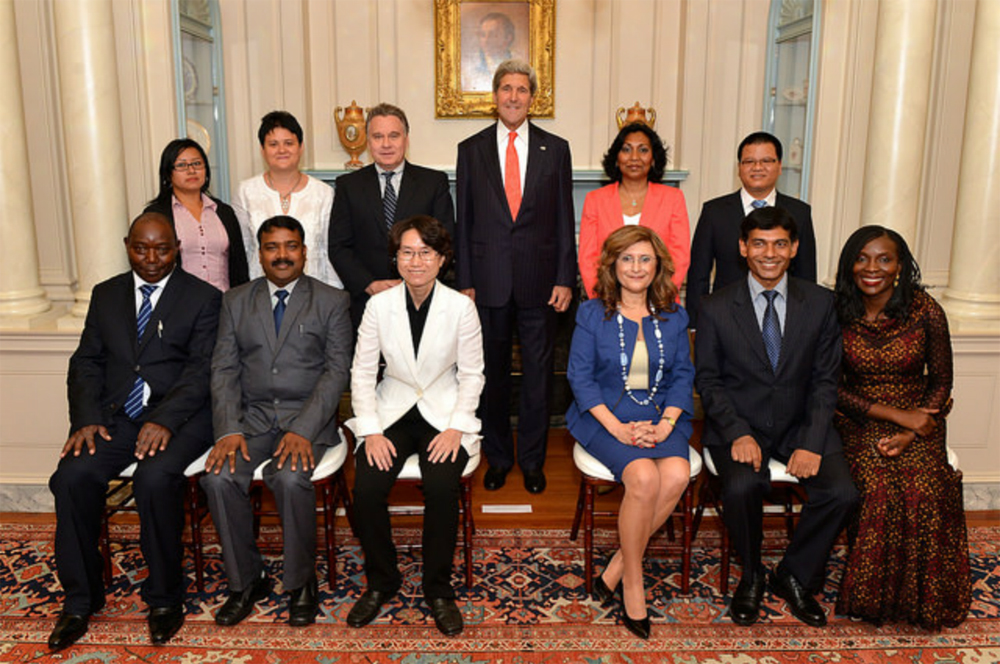- California Assembly OKs highest minimum wage in nation
- S. Korea unveils first graphic cigarette warnings
- US joins with South Korea, Japan in bid to deter North Korea
- LPGA golfer Chun In-gee finally back in action
- S. Korea won’t be top seed in final World Cup qualification round
- US men’s soccer misses 2nd straight Olympics
- US back on track in qualifying with 4-0 win over Guatemala
- High-intensity workout injuries spawn cottage industry
- CDC expands range of Zika mosquitoes into parts of Northeast
- Who knew? ‘The Walking Dead’ is helping families connect
Korean activist honored for fighting sex trafficking

The U.S. State Department, with Secretary of State John Kerry, honored Ko Myeong-jin (sitting third from left) and nine other international activists as “heroes” on Friday. (The U.S. State Dept. photo)
By Kim Young-jin
A Korean activist honored by Washington for assisting human trafficking victims hopes the award will spur the nation to better deal with the problem.
The U.S. State Department on Friday named Ko Myeong-jin and nine other international activists as “heroes” in its annual Trafficking in Persons (TIP) report.
Ko is director of the Seoul-based Dasihamkke (다시함께) Center, which provides resources to sex trafficking victims.
She says Korea lags behind advanced countries in identifying and eliminating “modern day slavery.”
“Being (in Washington to receive the TIP Hero Award), I’ve realized that Korea is the strongest country, economically, of all the countries that have been awarded,” she said in a phone interview. ”This award will encourage us to think about how to extend the fruits of our economic growth to our most vulnerable people.”
The other heroes were from the Democratic Republic of Congo, India, Lebanon, Nepal, Nigeria, Peru, Romania, Trinidad and Tobago and Vietnam.
The TIP report is considered the gold standard in efforts to curb human trafficking. This year, Korea was deemed a Tier 1 country, meaning it complies with the minimum standards for the elimination of trafficking.
According to the report, Korea is a source and destination of various types of labor and sex trafficking.
Korean women are forced into prostitution at home and abroad, as are foreign women here. A growing number of runaway children are at risk for forced prostitution.
Victims are often economically vulnerable before falling pretty to traffickers, and harshly stigmatized when they escape.
Dasihamkke Center offers legal and medical services and its juvenile care division has taken 10,000 cases since opening in 2013.
Ko grew up near Yongjugol, a huge red light district in Gyeonggi Province that was formed to serve U.S. service members during the 1950-53 Korean War. Her proximity made her want to help victims.
Clients who come to the center vary in age and circumstance. Some have been trafficked abroad, others in Korea. A significant number of runaway teens – including a growing number of boys – seek services after being lured into prostitution.
Society doesn’t understand the impact of sex trafficking, the activist said.
“When people engage in prostitution, they completely fall apart, both physically and mentally. They become anxious, depressed and are at times unable to control their anger. They become unable to trust people.
“Those who have engaged in prostitution have been branded by society, blamed, and so they are forced to live in anxiety.”
Social workers describe how traffickers manipulate vulnerable people with too-good-to-be-true job offers. They trick them into incurring massive amounts of debt — a key tactic in controlling victims.
The nation last year revised the criminal code to define and prohibit human trafficking.
Ko said many police think of human trafficking victims only as being held captive and tied up. In reality, however, traffickers today use force as well as intimidation and subtle manipulation.
“There’s a gap between NGOs and the government. Authorities see trafficking as a narrow issue, while NGOs want to look at it more broadly,” she said.
“What we’re saying is that it’s not just about physical confinement. We need to look more closely at the issue. By (broader) international standards, there is more human trafficking going on here than one would think.”
Ko said the honor validated the work of the anti-trafficking community in Korea.
“The work we do is hard, but this award will definitely motivate us,” she said, adding that eradicating all human trafficking is the ultimate goal.















